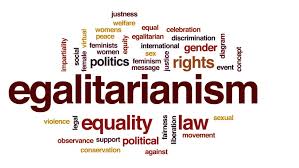
The Philosophy of Egalitarianism
Egalitarian Ethics evaluates communication by the criterion of equality.
The central question is have the conditions produced by the communication enhanced or hindered equal treatment for the individuals who are affected by it?î
Egalitarians discuss their position in contrast to two other kinds of ethics:
- Egoistic ethics which asks the question, is the outcome good (or positive, or helpful, or gratifying) for the person doing the evaluating.
- Altruistic ethics which is the ethic of unselfishness (choice is for the best of the other(s) without considering the needs or wants of the self)
Egalitarians theorize that human affairs are better served by an ethic that prevents the weaker or less protected members of society from being taken advantage of by stronger members.
The Philosophy of Egalitarianism
Egalitarians pose the question, do all have equal access to communication, information, channels, and interpretations that keep society viable?î
John Rawls – contemporary philosopher. In a theory of Justice (1971) he develops metaphorically a criterion called the veil of ignorance which communicator may use to evaluate their social acts.
The Philosophy of Egalitarianism
When considering how to act or speak toward others; Rawls’s theory of justice requires individuals who are self-interested in a particular social outcome to place their acts on one side of a metaphorical curtain and everyone else who could possibly be affected on the other side including themselves), regardless of race, class, gender, power, or other distinctions.
Rawls suggests that ethical communicators who are about to make a decision should remove themselves mentally from their actual circumstances in order to enter a hypothetical reality (behind the veil) from which they are as likely to emerge weak and dependent as powerful and independent.
Decisions made on one side of the veil of ignorance therefore could not take such distinctions or the biases arising from them into account. Subsequent communication decisions would potentially influence all parties equally and fairly, and justice would be the theoretical result.
As a Rawlsian egalitarian, you’d have to place that friendship on the other side of the veil and make the ethical decision on how to communicate without resource to either the fact of the friendship or your egoistic desire to maintain it. The social fact of friendship would have no fundamental relevance to the ethical decision.
The Philosophy of Egalitarianism
The right thing has more to do with maintaining a just or fair social community than it does with maintaining social privileges or special information such as who are friends and who aren’t. Such dimensions should not be critical in ethical decision making in this view.
Although the deontological, teleological and egalitarian theories of ethics are only generalizations that summarize complex systems of philosophical thought in ethics, they provide a background for our survey of ethical systems with more specific application to communication theory.
We can write this or a similar paper for you! Simply fill the order form!




